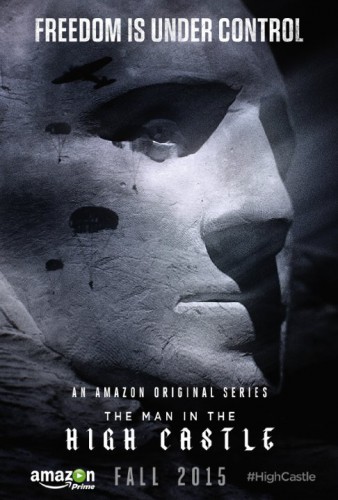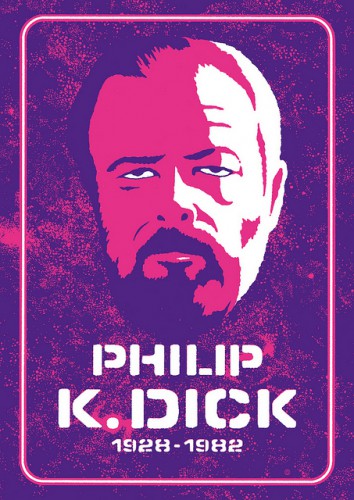
Probable spoilers below. We only have the pilot episode of the TV series available, and I’m giving away plot details of both the pilot and the book on which the series is based. The latter may/may not make their way into the TV show.

Promotional image via IMDB.com
The pilot episode for Amazon’s adaptation of The Man in the High Castle followed quickly by the excellent Audible.com audiobook of the Philip K. Dick source material have haunted me for a couple weeks now. I am particularly distressed by Amazon’s decision to add a resistance movement to Nazi-occupied America in this alternate history. Dick did not imagine one in the original novel.
The basic scenario of the novel is unchanged in the TV pilot: the Axis powers won World War II decisively and split the former United States into a Nazi-controlled east, Japan-controlled west (the Pacific States of America, or PSA), and a neutral zone (the Rocky Mountain States). The TV pilot recreates New York and San Francisco as occupied cities about 15 years after the 1947 end of WWII. Times Square, in particular, has a nightmarish Blade Runner vibe that provides far more eloquent exposition than a voiceover could accomplish.
In the TV pilot, though, a resistance against the Nazis exists in occupied America. The addition will surely help propel the plot far better than Dick’s frequent, long exposition about the I Ching. More than that, though, the change allows the viewer to immediately identify with an American movement for freedom and against racial hatred. It allows us to imagine that we would be more likely to join Free France than Vichy France.
The only bit of anti-Nazi subterfuge is when an SS officer, Mr. Baynes, goes undercover as a Swedish businessman visiting Mr. Tagomi, the head of the Japanese trade mission in San Francisco. The subject of the meeting is a planned H-bomb attack on the Japanese archipelago. Mr. Baynes, though, is not working against his government but for a particular faction within it; he is trying to win supremacy for the SS in a power struggle at the top of the German government.
When two agents from another faction send goons to kill Messrs. Baynes, Tagomi, and Tedeki (the latter a Japanese general), Mr. Tagomi kills them with his antique revolver. He starts consulting the I Ching immediately, and Mr. Baynes’ inner thoughts give us the first indication about why there is no resistance in Dick’s novel:
Coming over beside Mr. Baynes, General Tedeki said in a soft voice, “You witness the man’s despair. He, you see, was no doubt raised as a Buddhist. Even if not formally, the influence was there. A culture in which no life is to be taken; all lives holy. [. . .]
“That book will help him, for it provides an external frame of reference.”
“I see,” Mr. Baynes said. He thought, Another frame of reference which might help him would be the Doctrine of Original Sin. I wonder if he has ever heard of it. We are all doomed to commit acts of cruelty or violence or evil; that is our destiny, due to ancient factors.

Promotional image via IMDB
Mr. Baynes’ statement is applicable beyond the specific context in which he thinks it. Original sin not only nullifies our pretensions to pure virtue but is also the reason there is no resistance. The latter point is shown in contrast to the TV pilot. One of the compromises the TV pilot made was to portray Nazi-occupied New York as bleak and the citizens as pissed off over the loss of their country. The few glimpses of the huge Nazi-controlled swath of the world in Dick’s novel, however, portray it as an industrially advanced superpower with a high standard of living for those of European ancestry. They have also achieved science-fiction level technological feats between 1947 and 1962: they drained the Mediterranean for farmland, can travel from Germany to San Francisco in 45 minutes via rocket ship, and started colonizing Mars and Venus. The PSA, which is considerably freer, lags the Nazi world in technology and probably standard of living.
Dick’s novel implies, therefore, that the current residents of Nazi-occupied America (except for undesireables, of course) want things to stay as they are. Original sin has won. We are no better than the ordinary Germans who, eventually, gave themselves to an evil regime.
It’s even bleaker than that, though. Mr. Baynes wonders, in the end, whether his plot was worth the effort:
No wonder Mr. Tagomi could not go on, he thought. The terrible dilemma of our lives. Whatever happens, it is evil beyond compare. Why struggle, then? Why choose? If all the alternatives are the same. . .
Evidently we go on, as we alays have. From day to day [. . .] But we cannot do it all at once; it is a sequence. An unfolding process. We can only control the end by making a choice at each step.
He thought, We can only hope. And try.
On some other world, possibly it is different. Better. There are clear good and evil alternatives. Not these obscure admixtures, these blends, with no proper tool by which to untangle the components.
We do not have the ideal world, such as we would like, where morality is easy because cognition is easy. Where one can do right when there are no alternatives.

https://www.flickr.com/photos/christopherdombres/
Dick sees through our misguided, utopian dreams. Mr. Baynes is describing his world, over half of which is ruled by the Nazis and another third by imperial Japan, but he is also describing the readers’ world. Nothing we do is pure, and we can never know whether our efforts will result in the desired effect. We never know whether sin (our own or someone else’s) will pervert whatever good we intended.
The Man in the High Castle TV series will be exciting, visually stunning, and imbued with American self-satisfaction at having saved the world 60 years ago. The novel reminds us, though, that sometimes the violence in the world is not forced upon us so much as embraced without any resistance to speak of. In the TV show pilot, the Nazis won the war, but the citizenry is ineffectually revolting. In the novel, the Nazis won, and occupied America settles into the new, comfortable reality.
I am not predisposed to conclude with something positive, and that reflects both my melancholic disposition and exhaustion at having The Man in the High Castle in my head for the past couple weeks. Dick does not offer a real solution (unless I am completely misunderstanding the ending, which is last-episode-of-Lost level incomprehensible), so any comfort I receive must come from outside his work and my own, original-sin-marked thoughts. Even when I do the good that the law commands, even if I resist the forces of evil around me every now and then, I will do it with a broken, selfish heart. Therefore:
Gracious God, the comfort of all who sorrow, the strength of all who suffer: Let the cry of those in misery and need come to you, that they may find your mercy present with them in all their afflictions; and give us, we pray, the strength to serve them for the sake of him who suffered for us, your Son Jesus Christ our Lord. Amen.

COMMENTS
4 responses to “Is Resistance Futile? Initial Impression of the Pilot Episode of The Man in the High Castle”
Leave a Reply













Watching Amazon’s pilot encouraged me to re-read ‘The Man in the High Castle’. Amazon’s loss; my gain. While Amazon’s adaptation is certainly very entertaining, it is unarguably weak tea when compared with Dick’s work. Read. The. Book.
I feel the same way. I’ve only read 2 of his books, but I can see that the typical Hollywood treatment for a Phillip K. Dick book is to turn a philosophical novel into a sci-fi action-adventure. The TV pilot was best at displaying the world that Dick created visually, but it does make too many compromises in order to make it more palatable to the American TV audience.
I hope this doesn’t break some hard-and-fast rule about spoilers (dear reader, you were warned above), but what did you think of the ending? I haven’t read any secondary literature yet, but I couldn’t figure out what was going on with the “Grasshopper” author.
Ah, I forgot to say: Was it weaker than the tea from Robert Childan’s nickel dispenser?
The joke loses something when you forget to say it the first time….
More on the upcoming series: http://www.telegraph.co.uk/culture/tvandradio/11983818/The-Man-in-the-High-Castle-stars-stripes-and-swastikas.html